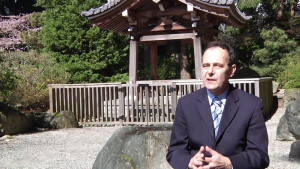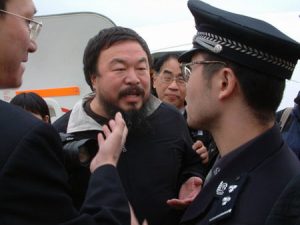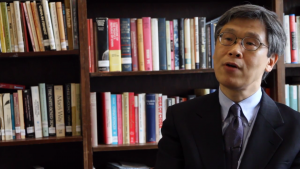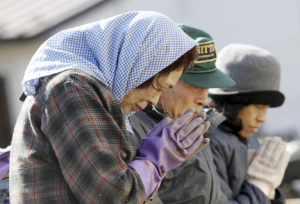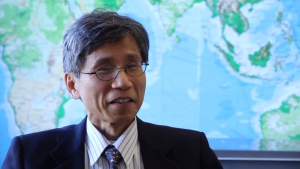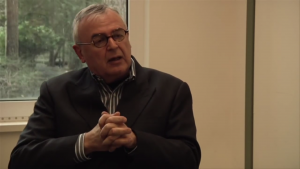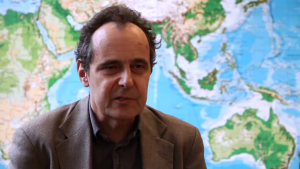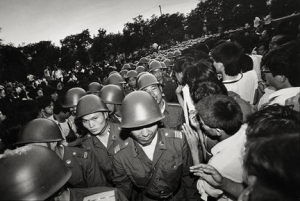Japan One Month after the Earthquake (Video Interview with David Edgington)
Memo #72 – One month after the March 11, 2011 Japan earthquake, we followed up with Japanese geography expert David Edgington. He characterized the first month with emergency response, learning, and information gathering. He says most of the major infrastructure has been reconstructed. But getting food and essential services to those affected remains a constant challenge. In the second month, the recovery stage will begin. This includes removing massive amounts of rubble and improving the health of survivors. There will also be efforts to build temporary housing to accommodate about 150,000 survivors who are in evacuation centres, including school gymnasiums.
Chinese Artist/Activist Ai Weiwei Detained
Memo #71 – Famous artist, tweeter, and critic of the Chinese authorities Ai Weiwei (艾未未) disappeared on April 3rd, 2011. This marks the latest in a series of arrests and detentions of human rights activists, bloggers, and lawyers in the Chinese government’s crackdown in response to fears of a jasmine revolution in China. Yet rather than having links to a ‘colour’ revolution, it is Ai’s self-assigned role as memory-keeper for the child victims of the 2008 Sichuan earthquake and obsessive recorder of state-sanctioned acts of violence and surveillance that has led to his detention. Ai Weiwei has taken on the time-honoured task of Confucian historian, allocating praise or blame or imperial censor critiquing a ruler’s shortcomings. His is a modern take on ancient roles: documenting abuses and criticizing injustices by using the internet and social media.
Literature in 21st Century China – Harvard Professor David Der-wei Wang (Video Interview)
Memo #70 – What is the status of literature in 21st century China? Harvard professor David Der-wei Wang analyzes this question in a brief video interview. He discusses the impact of the internet, which has become an important medium for the dissemination of politically sensitive works. He mentions that there has been a resurgence of genres such as science fantasy to a prominence not seen since the late Qing dynasty. He talks about the new concept of “Sinophone literature,” which redefines “Chinese literature” as a field determined by language rather than purely by geography. He further touches on important new works, such as Hu Fayun’s novel, “Ruyan@SARS.com,” which was first serialized on the Internet but banned upon its print publication.
Japanese Buddhism After the Earthquake: Memorials, Spiritual Comfort, and Emergency Response
Memo #69 – On the 7th day after the earthquake, at precisely 2:46 p.m., sirens rang out along Japan’s northeastern coast. Millions paused, placing their palms together and bowing their heads to remember those who were lost. In the Japanese Buddhist funerary cycle, the living perform rites for the dead every 7th day, continuing until the 49th day after death. Spirits of the deceased are believed to spend 49 days traveling to their next rebirth. As communities transition to harsh new realities, Japanese Buddhist groups are hard at work in expected ways, performing memorials for those lost and comforting those displaced. Perhaps unexpectedly, they are also organizing an effective emergency response.
Key Issues Facing East Asia – (Video Interview with Dr. Tun-jen Cheng)
Memo #67 – In this interview, Dr. Tun-jen Cheng discusses a range of key issues facing East Asia today, including religion, governance, economics, and politics. When speaking about a religious revival in China, Dr. Cheng notes that Christianity is accepted by many new middle class urbanites as a source of inspiration and a symbol of modernity and greatness. Dr. Cheng then gives an account of the challenges facing East Asian democracies. Most notably, he mentions the public’s complaints about the shortage of horizontal accountability – the checks and balances between various branches and units of government. Nonetheless, he concludes that East Asian democracies are quite robust when compared to systems in Southeast Asia and the Middle East.
Former Canadian Ambassador to Japan on the Crisis (Video Interview)
Memo #66 – In an exclusive interview, Joseph Caron discusses the crisis in Japan. As former Ambassador to Japan and Honorary Professor at the Institute of Asian Research, Caron is in a position to evaluate bilateral relations between Canada and Japan following the recent earthquake, tsunami, and problems at the Fukushima Dai’ichi nuclear power plant. Caron notes that the government of Canada has already offered a great deal of support to Japan and may be asked for their expertise on such things as urbanization and construction codes once rebuilding begins. Moreover, he hopes that Canada and Japan can sustain strong political relations during what may be a period of political uncertainty in Japan.
UBC Japanese Geography Expert – Full Video Interview
Memo #65 – UBC Japanese geography expert, Dr. David Edgington, compares the earthquake that struck Japan on March 11, 2011, dubbed the “Sendai Regional Earthquake,” with the Great Hanshin Earthquake of 1995. In his view, the Japanese government’s response to the Sendai Regional Earthquake is a textbook example of emergency response, indicating there have been lessons learned from Kobe.
East Asia’s Population Crisis: Solutions
Memo #61 – Japan reported missing 230,000 centenarians in September 2010. This dramatic news highlighted among other things, the rapid aging of Japan’s population and its low total fertility rates. For the past decade, demographers have called attention to the impending population crisis in East Asia. Several countries saw fertility rates plummet to well below 2.1 births per woman – the rate required to sustain a population, assuming all other factors remain relatively constant. The problem has been compounded by increased life expectancy and the lack of immigration flows to compensate for birth and death rates.
Is China the Next Domino?
Memo #59 (Part 2) – Authoritarian regimes seem to be crumbling almost daily. Will China go the way of Middle Eastern dictatorships?
The similarities are obvious. China relies on harsh measures to put down calls for democratic reform. And it is plagued by a huge gap between rich and poor, rampant corruption, rising prices of basic food stuffs, and high unemployment among recent university graduates.
Comparing Tahrir Square Demonstrations of 2011 and Tiananmen Protests of 1989
Memo #59 (Part 1) – At first glance there are many similarities: huge crowds (including many young people) demonstrate peacefully in the main square of the capital city against a repressive government that has been in power for a long time; the crowd has no clearly defined leaders; and the military allows the demonstrations to continue over an extended period of time.
